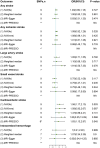Cardiac Troponin I and Risk of Stroke: A Mendelian Randomization Study
- PMID: 35210829
- PMCID: PMC8858012
- DOI: 10.2147/IJGM.S351034
Cardiac Troponin I and Risk of Stroke: A Mendelian Randomization Study
Abstract
Purpose: Cardiac troponin I (cTnI) is a well-established biomarker for stroke prediction, especially in patients with heart diseases. However, the causal effect of circulating cTnI on stroke remains unclear.
Methods: We employed Mendelian Randomization (MR) analysis to determine the associations between genetically predicted circulating cTnI levels and stroke and its subtypes. Summary-level data for exposure and outcomes were generated from different genome-wide association studies. Single-nucleotide polymorphisms (SNPs) associated with circulating cTnI at genome-wide significance level (P < 5 × 10-8) were employed as instrumental variables (IVs). We used fixed-effect inverse-variance weighted (IVW) as the main method for pooling MR estimates. Sensitivity analyses and multivariable MR analyses were carried out to assess the robustness of the results.
Results: Using the fixed-effects IVW method, we found that genetically elevated plasma cTnI levels may have a causal effect on the risk of cardioembolic stroke (CES) (odds ratio (OR), 1.58; 95% confidence interval (CI), 1.17-2.13; P = 0.003). Additional analyses including multiplicative random-effects (mre) IVW, weighted median, MR-Egger and MR-PRESSO yielded similar results, but with broader CIs that span 1.0. The total effect of cTnI on CES was attenuated by adjusting for the effect of atrial fibrillation (OR,1.26; 95% CI, 0.76-2.11; P = 0.371) and smoking (OR,1.53; 95% CI, 0.87-2.66; P = 0.137). In addition, we found no causal effect of cTnI on the risk of any stroke and other stroke subtypes, including any ischemic stroke, large artery stroke, cardioembolic stroke, small vessel stroke, and intracerebral hemorrhage. These results were consistent across sensitivity analyses.
Conclusion: This study provides little evidence that increased serum cTnI levels lead to a higher risk of stroke.
Keywords: Mendelian randomization; cardiac troponin I; causation; genome-wide association studies; stroke.
© 2022 Chen et al.
Conflict of interest statement
The authors declare that they have no conflict of interest.
Figures


Similar articles
-
Genetically Predicted Cardiac Troponin I Concentrations and Risk of Stroke and Atrial Fibrillation.J Stroke Cerebrovasc Dis. 2022 Mar;31(3):106267. doi: 10.1016/j.jstrokecerebrovasdis.2021.106267. Epub 2021 Dec 23. J Stroke Cerebrovasc Dis. 2022. PMID: 34954601
-
No Causal Effect of Telomere Length on Ischemic Stroke and Its Subtypes: A Mendelian Randomization Study.Cells. 2019 Feb 14;8(2):159. doi: 10.3390/cells8020159. Cells. 2019. PMID: 30769869 Free PMC article.
-
Systemic lupus erythematosus and the risk of cardiovascular diseases: A two-sample Mendelian randomization study.Front Cardiovasc Med. 2022 Sep 2;9:896499. doi: 10.3389/fcvm.2022.896499. eCollection 2022. Front Cardiovasc Med. 2022. PMID: 36119739 Free PMC article.
-
Age at menarche and ischemic heart disease: An update mendelian randomization study.Front Genet. 2022 Nov 3;13:942861. doi: 10.3389/fgene.2022.942861. eCollection 2022. Front Genet. 2022. PMID: 36406117 Free PMC article.
-
Monounsaturated Fatty Acid Levels May Not Affect Cardiovascular Events: Results From a Mendelian Randomization Analysis.Front Nutr. 2020 Sep 2;7:123. doi: 10.3389/fnut.2020.00123. eCollection 2020. Front Nutr. 2020. PMID: 32984395 Free PMC article.
Cited by
-
Association between metabolic syndrome and low back pain: a two-sample Mendelian randomization study.Sci Rep. 2025 May 21;15(1):17686. doi: 10.1038/s41598-025-02630-7. Sci Rep. 2025. PMID: 40399540 Free PMC article.
-
Association between growth factors and Sjögren syndrome: A two-sample Mendelian randomization study.Medicine (Baltimore). 2025 Apr 18;104(16):e42210. doi: 10.1097/MD.0000000000042210. Medicine (Baltimore). 2025. PMID: 40258744 Free PMC article.
-
Mendelian randomization studies on ischemic stroke: a field synopsis and systematic review.J Transl Med. 2025 Aug 22;23(1):955. doi: 10.1186/s12967-025-06992-4. J Transl Med. 2025. PMID: 40847399 Free PMC article. Review.
References
LinkOut - more resources
Full Text Sources
Research Materials

